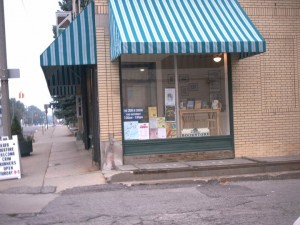 Pages Bookstore in Downtown Flint, Michigan.
Pages Bookstore in Downtown Flint, Michigan.
One of the most persistent writery romances is that one will be able to walk into any Barnes and Nobles or Borders and see a copy of her own book tucked neatly besides Thomas Pynchon or Toni Morrison. This is a questionable goal… and if you’re a self-publisher, downright unlikely. There are literally dozens of reasons. Here are a few:
Big booksellers work with distributors with whom they have established relationships; as your own distributor you probably lack the time or connections to build credibility with a chain.
Big booksellers largely rely on volume to stay afloat; any modest seller is stealing shelf space from the big guns. There’s little room for new, small-press, or self-published work at most big booksellers.
Big booksellers require a returns policy, whereby you will reimburse them for any books they are unable to sell. This is expensive.
And other reasons. Here’s another important one:
Big booksellers are going out of business.
This doesn’t mean that bookstores shouldn’t be a pillar of your marketing strategy. It just means that chain bookstores shouldn’t. Do you remember independent bookstores? Every town used to have one or two, and in big, literary cities, they are legendary. New York’s Strand. Chicago’s Seminary Co-Op. Denver’s Tattered Cover. For over twenty years now these bookstores have been on the defensive, losing customers and clout to the big chain bookstores.
And yet, the tide may be turning. Bookstores have always had an important role as community centers, the sort of business that builds a lasting relationship with customers. They’re informal places for conversation and observation. This communal ingredient involves more than a cup of coffee, and is something the chains never quite got right. Now, as chain stumble in a lean economy under exorbitant overhead and inefficiency, the surviving crop of independents have a brighter future. This, alone, is a good reason to prefer independent bookstores in your marketing strategy.
Here are a few more:
Independent bookstores work with distributors of all sizes, including small presses and self-published authors; they usually have a policy that makes it easy for you to stock your book with them.
Independent booksellers rely on repeat customers to stay afloat; topicality, local interest, and impeccable taste builds this loyalty over time. If your book is quality, they will view it as an asset.
Independent booksellers usually stock self-published and much small-press work through consignment. You are responsible for your stock and pay a commission (typically 40% of the cover-price) to the bookseller; this insures that you will never lose money to keep books in stock.
And other reasons. But here’s the most important one:
Independent booksellers are passionate about books; they have to be to stake their careers in such a fraught and difficult business. Promoting your book is often one and the same as promoting their business. As such, they will go the extra mile to present your book in the best possible light.
When Hungry Rats came out, I was able to stock books and schedule events straightaway at two independent bookstores: Pages Bookstore in Flint, Michigan, and Quimby’s Bookstore in Chicago. In both cases I was working directly with the store owners, and they were happy to answer any questions about their consignment policy and event scheduling. Significantly, all this required a minimum of effort on my part, which meant that I could instead pour my energy into promotion.
Build bookstores into your book marketing strategy.
But focus on independent bookstores.